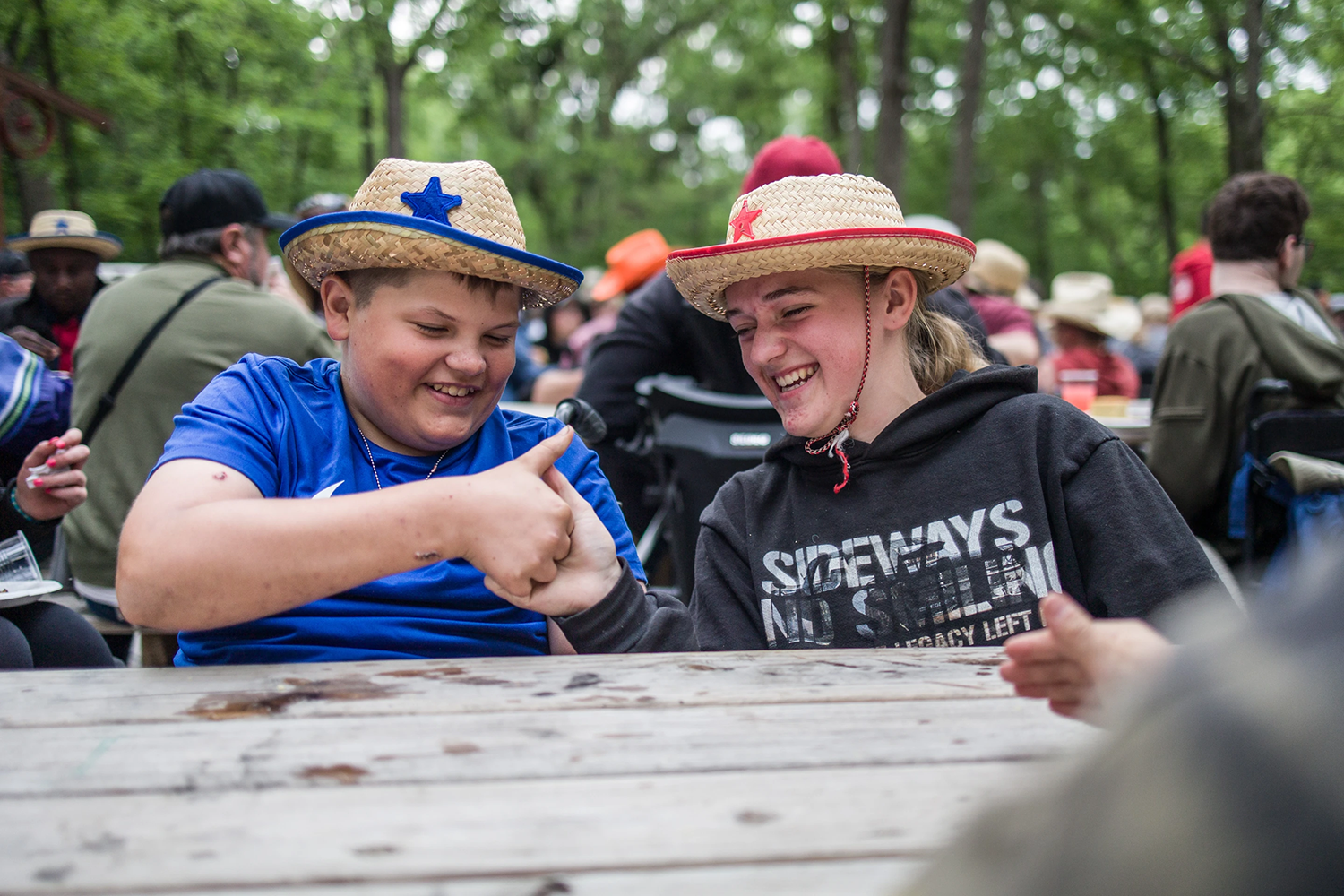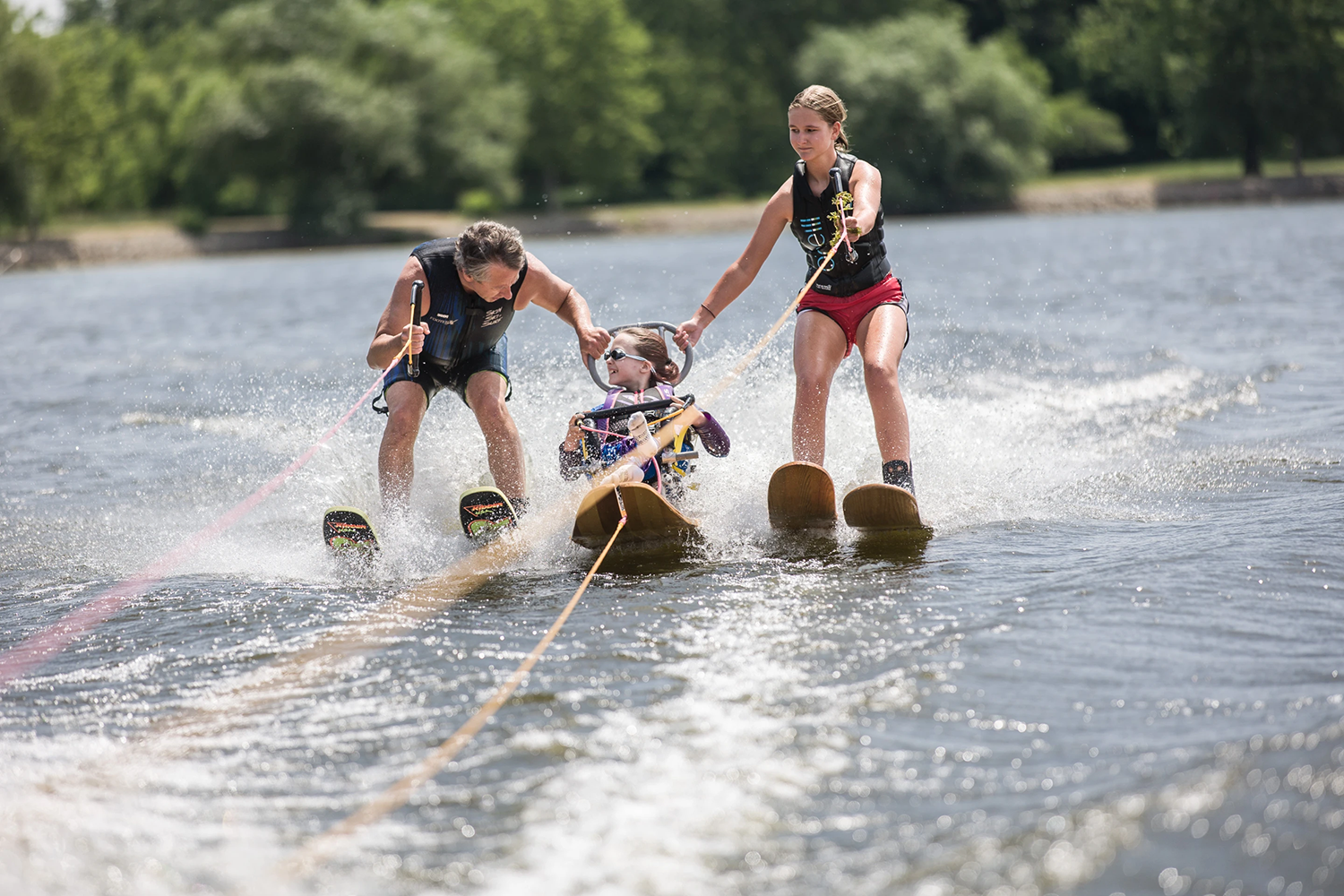From ‘I can’t’ to ‘I can’: Stewartville wheelchair camp fosters community, confidence
“If you come and watch and participate, you will witness some of the greatest triumphs of the human spirit,” National Wheelchair Sports Camp founder Bob Bardwell said.

Wheelers engage with musician Tony Melendez during National Wheelchair Sports Camp on Monday, June 12, 2023, at Ironwood Springs Christian Ranch in Stewartville. Traci Westcott, Post Bulletin
By Abby Sharpe, Post Bulletin June 18, 2023
Stewartville, Minnesota — When Pat Waletzko was a little girl, she’d lay on the floor of her family’s home on a dairy farm and, with her dad sitting in his easy chair, read every horse advertisement in the Minneapolis Sunday Tribune.
“I’d go, ‘Dad this is the one.’ Then I’d read the next ad. ‘Oh no, this one’s even better,’” Waletzko recalled.
She described herself as horse crazy, obsessed with the animals for as long as the now 74-year-old can remember. Her dad finally bought her a Palomino Filly when she was 12.

Pat Waletzko of St. Paul, left, rides a horse around during National Wheelchair Sports Camp on Monday, June 12, 2023, at Ironwood Springs Christian Camp in Stewartville. Waletzko used to show horses before a medical complication forced the amputation of her lower extremity. Traci Westcott, Post Bulletin
Waletzko bought her first show horse when she was living in an apartment in south Minneapolis in the late 1970s. She raised seven foals on her nine and a half acre farm in Watertown, Minn. — a farm Waletzko was forced to give up when her left leg was amputated after medical negligence.
Fast forward 19 years since her amputation, and Waletzko sits in a horse barn at Ironwood Springs Christian Ranch outside Stewartville. It’s the 37th year of the National Wheelchair Sports Camp, a five-day camp featuring physical activities designed for people in wheelchairs.
It isn’t the first time Waletzko has ridden a horse since her amputation. It is the first time she’s climbed on a horse surrounded by other people who share her experiences.
National Wheelchair Sports Camp is the brainchild of Bob Bardwell, the founder of the ranch, an author and public speaker, who was injured in a construction accident 50 years ago.
“The camp is the most fun and challenging sports camp in the world. I say that every year,” Bardwell said. “If you come and watch and participate, you will witness some of the greatest triumphs of the human spirit.”
Camp director and former participant Craig Blanchette has heard “I can’t do that” numerous times. The camp strives to get wheelers to flip that mindset by creating an accessible environment where campers can participate in every activity.
“People start to fully come alive, and they start realizing what life is like with very few limits,” he said. “This is what I’m most excited about with camp: You come in and your eyes are opened to all the things you can do and you stop making excuses for ‘life is hard,’ and you dive in and you love it.”
Blanchette said coming into camp is like entering the Twilight Zone.
“People come to camp living in a world where most everybody walks,” he said. “You show up and you’ve got wheels to the left of you and wheels to the right of you.”

Logan Hovanetz, 13, of Elk River, and Adaylia Borgmeier, 14, of Madison Lake, play thumb war, before dinner at National Wheelchair Sports Camp on Monday, June 12, 2023, at Ironwood Springs Christian Ranch in Stewartville. For many attendees, camp is the first time they are able to meet and connect with other wheelers. Traci Westcott, Post Bulletin
That was the scene at the chuckwagon dinner Monday night: Campers sat shoulder to shoulder, filling the dining area. The community-building aspect of the camp was evident, with the shared experience of using a wheelchair immediately connecting campers. Strangers talked as if they’d known each other forever and kids played like best friends.
It’s one of the inevitable positives of creating an environment that people don’t experience daily.
One thing was clear: Camp is unlike anything else. This year’s camp was Waletzko’s first, and she was amazed by the opportunities at the ranch.
“I’ve always been real athletic,” she said, “so to come here and have all these different activities is just so stimulating for me. I don’t want to quit anything.”
| ‘It changed my life’ |
Campers quickly crowded around the zipline, which crossed the Root River. Wheelers asked for the chance to go twice before their first turn came. Volunteers strapped campers in and raised the cable line. Before the camper zipped to the other side, the crowd of onlookers erupted in cheers, shouting encouragement to the camper.
The emotional support and camaraderie displayed took sportsmanship to a different level. Campers weren’t lazily clapping; they were genuinely ecstatic that their friend had the chance to experience an activity that is otherwise inaccessible to them.

Emeri Dryer, 13, of Crested Butte, Colorado, water skis with the help of volunteers from the Bayside Water Ski Show team during National Wheelchair Sports Camp on Tuesday, June 13, 2023, on Fountain Lake in Albert Lea. Traci Westcott, Post Bulletin
The support didn’t waver no matter the event: All throughout the 10k race, obstacle course, water skiing, horseback riding, scuba diving and pickleball, dodgeball, softball and soccer games, campers showed their excitement and encouragement for other campers.
Rich Noll attended the first wheelchair camp in 1986 as a 9-year-old. His experience has shifted from excitement of trying new activities to being a cheerleader for participants trying the activities for the first time.
“You see somebody do something for the first time that they’ve never seen done in a wheelchair,” he said. “I just feel so proud for them.”
Campers travel from across the U.S. and as far away as Africa to challenge themselves over the course of the camp. For some participants, like Teresa Valenzuela, the camp is less of a physical challenge and more of a mental one.
Blanchette invited Valenzuela to camp three years ago, and she automatically said, “I can’t.”
“I came to the realization that I’ve been living on the edge of ‘I can’t’ my whole life,” she said.
Valenzuela attempted suicide at 27 after years of battling alcoholism. After turning 50, she embraced religion, and, a few years later, eventually accepted an invitation to the camp.
Now, the 58-year-old is embracing opportunities instead of denying them. Valenzuela has been sailing in San Diego for two and a half years, and she’s won a couple of races in the San Diego Bay.
“It changed my life,” she said of the camp. “It changed the trajectory of my life.”
| By Abby Sharpe |
| Abby Sharpe joined the Post Bulletin in February 2022 after graduating from Arizona State University with a sports journalism degree. She loves sports, ’90s sitcoms, historical fiction and Quentin Tarantino movies. Readers can reach Abby at 507-285-7723 or asharpe@postbulletin.com. |
Source Post Bulletin
